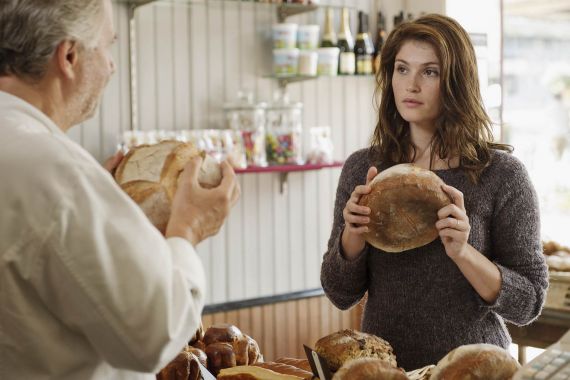 Set in the Normandy region of France, Fabrice Luchini
(In the House, Paris) plays a married
publisher-turned-baker named Martin Joubert, who is amused to find that his new neighbors from England are
named Charlie (Flemyng, Stonehearst
Asylum) and Gemma Bovery (Arterton,
The Voices), very reminiscent of the characters
from Gustave Flaubert's classic novel, "Madame Bovary", Charles and
Emma Bovary, and in the same locale as where the events of the book
are set, no less. Martin soon becomes smitten by his young and alluring
neighbor, but becomes increasingly anguished when she begins to get
bored being stuck at home, and soon engages in romantic dalliances
with certain men visiting the village while hubby is away on business,
not only because those men aren't him, but because he feels that he
knows exactly how things will play out, given that this is very
similar to what Flaubert wrote in the 19th Century.
Set in the Normandy region of France, Fabrice Luchini
(In the House, Paris) plays a married
publisher-turned-baker named Martin Joubert, who is amused to find that his new neighbors from England are
named Charlie (Flemyng, Stonehearst
Asylum) and Gemma Bovery (Arterton,
The Voices), very reminiscent of the characters
from Gustave Flaubert's classic novel, "Madame Bovary", Charles and
Emma Bovary, and in the same locale as where the events of the book
are set, no less. Martin soon becomes smitten by his young and alluring
neighbor, but becomes increasingly anguished when she begins to get
bored being stuck at home, and soon engages in romantic dalliances
with certain men visiting the village while hubby is away on business,
not only because those men aren't him, but because he feels that he
knows exactly how things will play out, given that this is very
similar to what Flaubert wrote in the 19th Century.
Gemma Bovery is adapted from a serial comic first published
in the newspaper, "The Guardian", by British cartoonist Posy Simmonds,
the same woman who adapted Thomas Hardy's novel, "Far from the Madding
Crowd" into a comic strip called "Tamara Drewe". Interestingly,
both film adaptations of Simmonds' work would star Gemma Arterton as the lead character,
and given that "Gemma Bovery" had been originally published in 1999,
eight years before Arterton first made a movie, her casting is just
one of the many uncanny coincidences that has seemed to work in
Simmonds favor, as she has grown to be perfect for the role she hadn't
known she was making for her namesake.
Directed by Anne Fontaine (Adore, Coco
Before Chanel), Gemma Bovery glides on a whimsical
air through most of the film, which relies on many coincidences, much
like its casting, to contrast the life of Gemma Bovery and Flaubert's
Emma Bovary, to the chagrin of Martin, whose knowledge of the literary
protagonist's tragic fate leads him to try to take steps with Gemma's
activities to make sure she doesn't also meet an equally sad demise.
She gets some very good, subtle performances by a very talented cast,
and Arterton herself adds great nuance to a role that could have
remained just a simple object-of-desire plot catalyst. There is
a difficult scene late in the film, which I won't spoil, that could
have seemed artificial if performed by someone of lesser talent, and
she makes it feel very real.
You don't necessarily need to be familiar with the Flaubert book in
order to follow Gemma Bovary, but I think it does help to
appreciate its many allusions. For instance, Martin's alarmist
attitude upon discovering that the Bovery's have arsenic around the place in order to
curb their field mice problem would make him seem like he's irrational
unless you're aware that he's fully aware of how Emma Bovary would use
such poison to end her own personal pain and depression in the book.
He thinks Gemma is like a ship heading for a fated iceberg and he's
the only one that can see it in her path, so he aims to do something
about it when he can when he sees a similar pattern unfolding before
his eyes. And yet, his own jealousy also steers her away from
the potential happiness of escape with another man because, deep down,
Martin doesn't want her to go, which steers the ship full steam ahead,
back into
the course of certain calamity.
For such a light, whimsical story, and in such a scenic setting as
Normandy, it's hard not to be lulled into Gemma Bovery's
escapist spell for 90
minutes of relatively easygoing charm, enough to find it a pleasant,
innocuous diversion. It's not really funny enough to be
classified a comedy, though it does often play like one, and not
really deep enough to be a resonant romance. It's more of a
story that tinkers playfully with certain old-fashioned conventions,
and along those lines, it does manage to maintain an objective
amusement. The ending of the story is a bit problematic, as it
goes from mild sitcom antics to some sort of mystery twist that feels
forced and unnecessary, but Fontaine manages to avoid choking after
overreaching a bit, bouncing the lighthearted tone back just enough to
patch things up before the end credit roll.
Qwipster's rating

 Set in the Normandy region of France, Fabrice Luchini
(In the House, Paris) plays a married
publisher-turned-baker named Martin Joubert, who is amused to find that his new neighbors from England are
named Charlie (Flemyng,
Set in the Normandy region of France, Fabrice Luchini
(In the House, Paris) plays a married
publisher-turned-baker named Martin Joubert, who is amused to find that his new neighbors from England are
named Charlie (Flemyng,